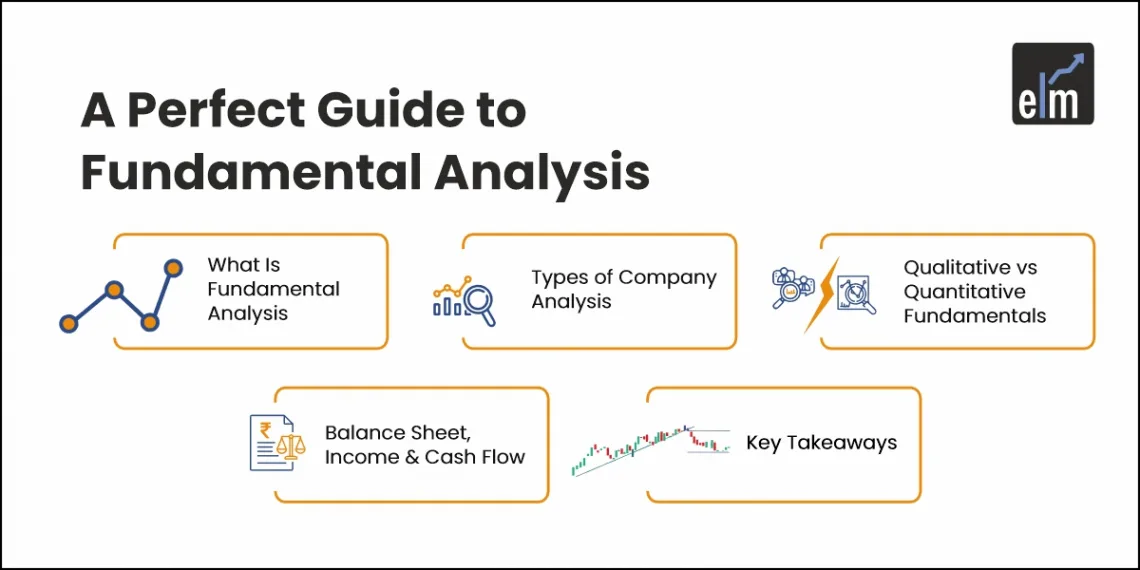Lets Dive into knowing Fundamental Analysis
We all think Stock Markets are an easy place to make Money Right!!! Well not really.
Investing in the Stock Market is a desirable option but not an easy task for generating additional wealth, especially in a changing interest rate scenario.
It stands out among the best investment alternatives as the returns earned here have the potential to beat Fixed Deposits/Bonds returns.
Thus, it not only helps investors to earn inflation-beating returns but also to fulfill their financial goals.
This is easier said than done as higher returns entail higher risks, and the same applies to the Stock Market, too. Here, not always one earns a profitable return, many a time individuals’ ends up losing even their principal amount.
So, it requires proper analysis and discipline by the investors to track down the best opportunity amid the plethora of stocks available, to be successful.
So here, we will be discussing one such prominent investment approach, “Fundamental Analysis” that will help investors to arrive at a better decision when it comes to creating wealth through Investment.
What is Fundamental Analysis ?
Fundamental Analysis covers anything related to the economic well-being of the company.
Its importance lies in the fact that the price of a stock is directly related to its performance.
As Warren Buffet rightly says “Price is what you pay and Value is what you get”.
Thus, the core intention of the fundamental analysis is to analyze both the quantitative as well as the qualitative aspects of a company to determine the “Fair” or “Intrinsic” value of a stock.
The fundamental analysis begins with understanding the state of the overall economy, then the specific industry, and finally the performance of the individual company.
This is also known as the Top-Down Approach.
Types of Company Analysis:
Company analysis is grouped into two categories:
- Qualitative Factors
- Quantitative Factors

So now we will understand the above two factors in detail. This will help the investors to choose fundamentally strong companies and create wealth over a long period of time.
Qualitative Fundamentals:
The qualitative analysis captures the company’s aspects or risks difficult to measure in numbers- such as management competencies and credibility, competitive strategies, R&D capabilities, brand recall, and others.
Investors usually ignore the qualitative analysis, which many a time costs them profoundly.
Here, we will focus on four key Qualitative aspects, which includes:
1. Business Model :
The first and foremost area where an investor should focus even before initiating any research is to know what exactly the company does to earn its revenues.
A business model describes the company’s plans for earning revenues, its products and services, the target market so as to maintain its profitability.
Companies need to constantly update, innovate and be able to withstand any technological disruption, adopt efficient marketing and business strategies for their smooth functioning without which they may run into losses and eventually get wiped out from the market.
2. Competitive Advantage:
Investors should usually prefer to invest in those companies that have been able to develop competitive advantages for themselves in terms of cost advantage, quality, brand, distribution network, etc.
This helps the company to create an economic moat around the business, thus helping the company to keep competitors at bay and enjoy longevity, growth, profits, and dominate the market share.
A company with a competitive advantage usually generates greater value not only for the company but also for its shareholders, over the long term.
3. Management:
Sound management with strong credibility always works for the betterment of the company and its employees and also generates wealth for the shareholders.
Thus, it is always in the interest of the shareholders to be associated with trustworthy and competent management rather than with management having questionable credibility.
There is no sure shot method available to analyze management.
However, investors can look into factors like management credentials, integrity, transparency, the viability of strategies and goals, past execution skills, competitiveness and length of tenure, etc.
4. Corporate Governance:
This is the framework of rules, practices, and processes which direct and control the firms as well as involves balancing the interests between management, directors, and stakeholders.
Investors should always invest in companies that are run ethically, fairly, transparently, and efficiently and whose management respects its shareholders’ rights and interests.
They should ensure that the communications made to them are clear, transparent, and understandable.
They should avoid companies that refrain from such practices or are under SEBI or Government lenses due to some misappropriation etc.
Investors should go through the Corporate Governance Report (available in the Annual Report) as well as the Auditors Report to have a clear understanding of the company’s governance.
Quantitative Fundamentals:
These are the measurable factors that influence the value of a firm. The biggest source of quantitative data is Financial Statements, analyzing which helps investors to make better investment decisions.
The three most important financial statements are:
1. The Balance Sheet:
This statement records a company’s assets, liabilities, and equity at a particular point in time.
It shows investors the financial structure of a company, listing down what a company owns and owes, thus helping to determine a company’s real worth.
Investors can determine the growth of a company by comparing its balance sheet over a period of time. It helps to understand a company’s worth like its Equity, debt, liquidity, asset base, and working capital position, among others.
2. Income Statement-
It reports the financial performance of a company over a period of time. Publicly listed companies present their Income Statements quarterly or annually.
It provides investors with an insight into how the net revenues realized by a company are transformed into net earnings (profit or loss).
Income Statement should be analyzed on a year-on-year and quarter-on-quarter basis, to understand a company’s operations, the efficiency of its management, and its performance in comparison to its peers.
Investors should also check areas like high expenses, depreciation, finance cost or any exceptional loss that erodes a company’s profitability.
Thus, it helps an investor to understand whether the company will be able to sustain its earnings growth and whether its performance will surpass its peers in the coming times.
3. Cash Flow Statement-
This is a very important financial statement, as it shows the true cash or liquidity position of a company.
It provides information on the cash inflows and outflows over a period of time.
It is difficult to manipulate the cash position of a company; therefore it is used as a concrete measure of a company’s performance. The statement focuses on three cash related activities:
I. Cash from Operations (CFO) :
This includes transactions from all the core or operational activities of a business.
Companies that manage their working capital requirements efficiently manage to generate positive cash from operations.
This helps them to plan for Capex or Acquisitions for future wealth creation.
II. Cash from Investing (CFI) :
This shows the cash flows that arise from investing gains or losses, It also provides information on changes in the company’s capital expenditure (CAPEX).
If CFI is negative then that means the company is on a growth path and investing in future potential and vice versa.
III. Cash from Financing (CFF) :
This reflects the cash required to fund the company’s work. This should always be positive as this gives us an idea that the company is taking funds and utilizing it properly.
But this comes with a caveat that is its Fund requirement should not be more than the Industry requirement. If it is then it’s a cause of concern.
You can use Fundamental scans to filter out fundamentally strong companies for investment using StockEdge App, now also available in the web version.
Key Takeaways:
- Fundamental Analysis helps investors to understand the qualitative as well as the quantitative factors.
- It is performed on historical and present data to anticipate future value.
- Qualitative factors should be given equal importance as they also have a bearing on the potential value of a firm.
- All three statements the Balance Sheet, Income Statement and the Cash Flow Statement should be used in conjunction to deduce various financial ratios.
- The major drawback of fundamental analysis is that is quite time-consuming.
Tell us if you are willing to do a fundamental analysis of the company in which you want to invest by writing a comment below:
Happy Learning!







